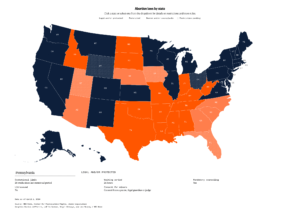In a polarizing decision, the Supreme Court of Florida ruled on Monday that the State Constitution’s privacy protections do not extend to abortion, effectively greenlighting a ban on the procedure after six weeks of privacy. However, amidst this restrictive ruling, there is a glimmer of hope for advocates of bodily autonomy.
The same court has also sanctioned a ballot question slated for this fall’s election, allowing Florida voters to decide whether to expand abortion access. This dual verdict has profound implications for the pro-choice versus pro-life discourse in America.
Ban and Ballot
The Florida Supreme Court’s verdict rested upon conservative-leaning majority, with a 6-1 vote in favour of upholding a 15-week abortion ban signed into law in 2022 by Governor Ron DeSantis. This ruling, in response to a lawsuit brought by Planned Parenthood, the American Civil Liberties Union and several abortion providers, sets the stage for a 6-week ban by 1 May, 2024. Justice Jamie R. Grosshans, in the majority opinion, cited the absence of a clear right to abortion within the Privacy Clause of the State Constitution.

There is still an opportunity for proponents of abortion rights. The approval of a ballot measure, by a narrow margin of 4 to 5, presents a chance for voters to directly influence the future of abortion access in Florida. The proposed constitutional amendment aims to guarantee the right to abortion before viability, typically around 24 weeks of pregnancy.
Hopes and Challenges
Lauren Brenzel, the campaign director of Yes on 4, the umbrella group backing the ballot initiative, hailed the decision, emphasizing the significance of placing decisions about abortion directly in the hands of Floridian voters. It would ensure that the voices of the people resonate in shaping abortion policy.
However, the road ahead remains fraught with challenges. The implementation of a 6-week abortion ban severely curtails access to essential healthcare for many Floridians. Danielle Tallafus, a Florida resident who had an abortion at 22 weeks due to foetal health complications, expressed concern about the events, saying that people should be able to make a decision to terminate a pregnancy with their doctors.
Florida was once considered a haven for women seeking abortions in the South. However, now it finds itself aligned with its neighbouring states in adopting highly restrictive abortion policies. The court’s decision is being referred to as “the largest single loss of care” since the overturn of Roe v. Wade.

Source: NBC News, Center for Reproductive Rights, state legislation
Graphic: Danica Jefferies, JoElla Carman, Nigel Chiwaya, and Joe Murphy / NBC News











Comments 1